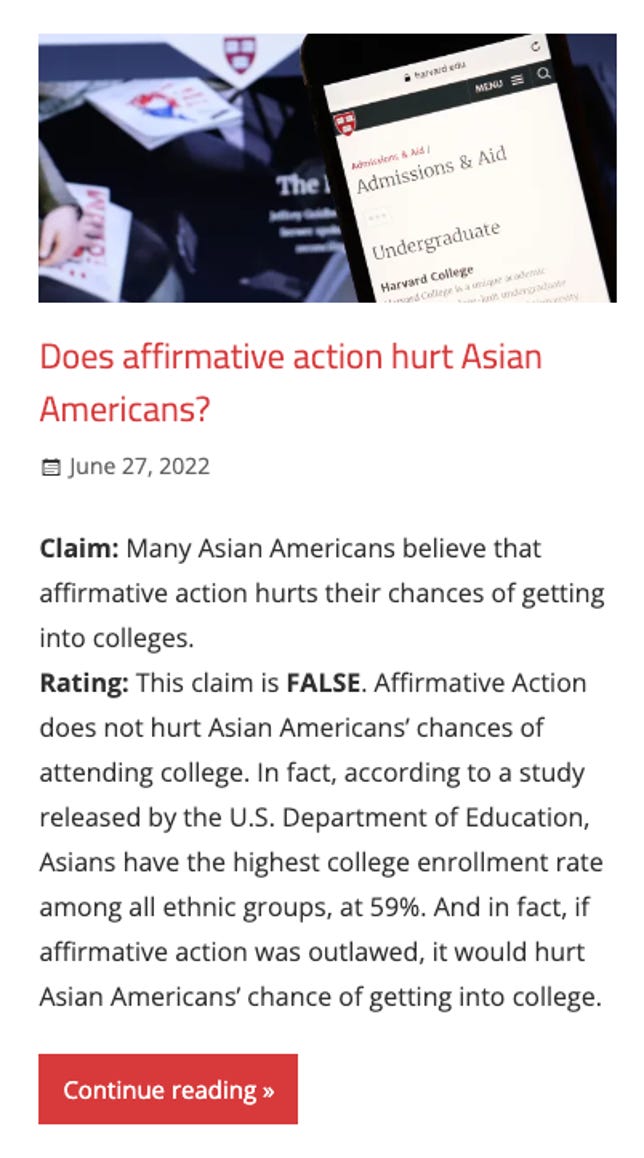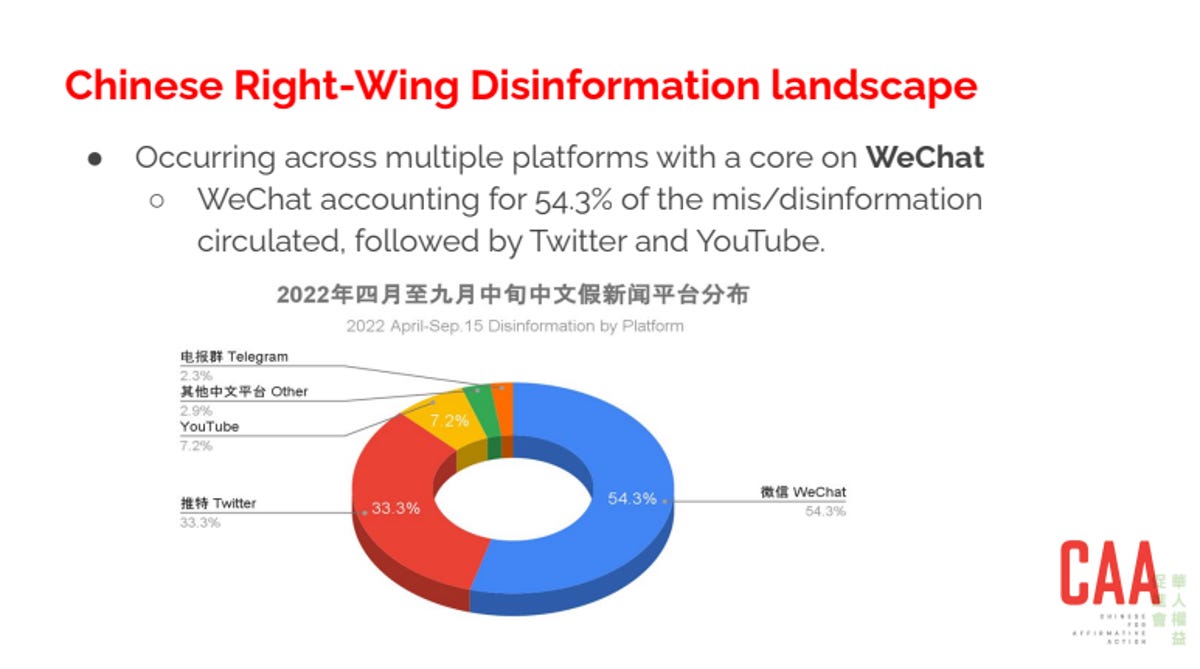Nearly 50 migrants, many from Venezuela, found themselves unexpectedly in Martha’s Vineyard last month, part of a political stunt by Republican Florida Gov. Ron DeSantis meant to protest US President Joe Biden’s immigration policy. Some migrants said they’d been told they were being flown to Boston, where they could get expedited immigration papers, NPR reported. People in the group were also given a brochure in Spanish that falsely promised cash, housing and help with Social Security card applications.
Misinformation and disinformation thrive on social media platforms, but different communities have different preferences when it comes to the social media platforms they use.
Members within Falun Gong created a news outlet in 2000 called The Epoch Times, which creates content that defends the religion and opposes the Chinese Communist Party. According to NewsGuard, a journalism and technology tool that provides trust ratings for news websites, Epoch Times fails to meet basic standards of credibility and transparency. It also regularly shares right-wing misinformation and bogus conspiracy theories about vaccines as well as false claims put forward by the fringe group QAnon.
Meta, YouTube, Twitter and other social media companies have policies against posting misinformation. However, most moderation is done in English, with other languages receiving limited resources. Voto Latino found that providing factual information to Latino communities before they see misinformation on social media made it more likely they wouldn’t share the false info. Researchers at Google found similar results, where people were shown short videos explaining the manipulation tactics behind misinformation and their ability to determine what was trustworthy and untrustworthy information improved.
— Judd Legum (@JuddLegum) September 20, 2022
3. Yesterday, https://t.co/Gl6evXRDcZ published a brochure that was provided to migrants to induce them to board a flight to Massachusetts.
 “Depending on the nature of the relationship the individual has with the person sharing the falsehood, it could be helpful to reach out directly to that person individually and engage with a positive, empathetic tone,” Jenny L. says. “In response to a misleading article that your aunt shares about vaccines on WhatsApp, for example, one might say, ‘I was curious about the article you shared about X, I did some Googling and found Y.'”
“Depending on the nature of the relationship the individual has with the person sharing the falsehood, it could be helpful to reach out directly to that person individually and engage with a positive, empathetic tone,” Jenny L. says. “In response to a misleading article that your aunt shares about vaccines on WhatsApp, for example, one might say, ‘I was curious about the article you shared about X, I did some Googling and found Y.'”
“They [first-generation Vietnamese Americans] want the United States to remain powerful so it does not collapse,” said Nick Nguyen, research lead and writer for Vietnamese fact-checking site Viet Fact Check. “They want it to remain prestigious so that it reinforces the very difficult choices and sacrifices they had to make to come over to the United States.”
‘Red scare’ means the same in any language
The caucus wants to see social media companies change their policies, put more investments into flagging false info and have culturally competent people to explain how misinformation affects Latino communities.
In the popular Chinese social media app WeChat, disinformation posts in Chinese claimed the US National Guard was being prepped to mobilize in anticipation of possible riots on Election Day in 2020, and Chinese Americans were advised to stay home. This mirrored a ploy targeting Latinos in 2016 when social media posts in Spanish told people they could text their vote instead of voting in person. Both claims were false.
This tactic is particularly effective because Latino, Chinese and Vietnamese communities in the US have many first-generation immigrants who come from communist countries. Misinformation peddlers play on the shared trauma and experiences people have around coming from authoritarian states, and they try to create fear that the US will be next to fall.
“We recruited more than 15 Chinese language writers, journalists, former journalists and fact-checkers, and we post around eight to 10 articles every week on our WeChat channel,” Niu says. “This initial effort is precisely because the disinformation/misinformation is still centered on WeChat.”
For Vietnamese and Latino communities, Facebook, Twitter and YouTube are home to much misinformation in Vietnamese and Spanish, while encrypted messaging apps WhatsApp, Viber and Telegram are also seeing more usage in these communities.
The Chinese for Affirmative Action group created a Chinese-language fact-checking site called PiYaoBa. The organization also goes directly to where the misinformation is being shared the most, WeChat.

Observers say disinformation played a part in some Latino voters deciding to support Donald Trump and other Republicans in the 2020 election, especially in parts of Texas and Florida.
CAA
Another group at the heart of misinformation in multiple languages is a media empire backed by a religious movement.
The throughline for much Spanish, Vietnamese and Chinese misinformation found on social media is communism. Scammers, religious movements, US right-wing political groups and other countries sow distrust in American institutions and create discord with the claim that they’re fighting communist influence in the US political system, though that’s far from the truth.
Falun Gong is a spiritual discipline founded in China in the early ’90s. In 1999, the Chinese government banned the movement, which it calls a cult. Li Hongzhi, the leader of the religion, moved to the US in the mid-’90s and settled in New York where he established a headquarters for Falun Gong called Dragon Springs.
As startling as DeSantis’ scheme was, it doesn’t match the magnitude of misinformation broadcast in different languages across social media. Latino migrants are bombarded by misinformation in Spanish on social media, according to a July report from the Tech Transparency Project. Chinese Americans and Vietnamese Americans — whose languages, along with Spanish, represent three of the most widely spoken non-English languages in the US — see huge amounts of foreign-language misinformation.
A breeding ground of misinformation
In April, members of the Congressional Hispanic Caucus met with YouTube CEO Susan Wojcicki about Spanish language misinformation and disinformation on the platform and then with Twitter and TikTok officials in May about the same issue. The members of Congress expressed concerns about the rampant misinformation and the need for policies to protect Spanish-speaking users.
To combat misinformation in Chinese and Vietnamese, organizations focused on those communities have created their own fact-checking websites.
China-based Tencent, the owner of WeChat, didn’t respond to a request for comment.
Asian communities are also being affected. “There’s just generally questioning of even legitimate news sources and this idea that they [Chinese Americans] don’t know who to believe, which is alarming,” said Jenny L., policy manager in the technology and telecommunications department at Asian Americans Advancing Justice – AAJC. “I think there’s also sort of increased apathy towards politics in general,” Jenny asked to be referred to only by her first name and last initial due to security concerns within her organization.
“We remove content that violates our Community Guidelines, raise authoritative content and reduce recommendations of borderline content in every market we operate,” Hernandez said in an emailed statement.
Nguyen says he’ll monitor the upcoming midterm elections for Viet Fact Check. He’ll be on the lookout for false claims made against candidates, like them being labeled as a communist, in close races in places like California and Texas, where misinformation could cause a seat to flip.
DeSantis’ act, which Texas authorities are investigating, provoked nationwide outrage partly, critics say, because it involved taking advantage of and deceiving people who don’t primarily speak English.
The insidious nature of this misinformation is that it doesn’t actually have ties to communism. These campaigns paint Biden and others in the Democratic party as “communists” because of their support for progressive policies and movements like affirmative action, immigration and Black Lives Matter. Red-baiting mailers filled with doctored images, for instance, played a role in one California House race this year.
THIS IS A LIE pic.twitter.com/0gGdax1I1p
Epoch Times didn’t reply to a request for comment.
First-generation Chinese Americans and immigrants from China more frequently use WeChat, a Tencent-owned social media platform for messaging and payments, according to misinformation researchers. US right-wing political groups also contribute to the misinformation in Latino communities. Kumar says her organization came across a video trending in Colombia that made false allegations about Venezuelans crossing the border. The group discovered the clip was repurposed by Prager University, an American conservative 501(c)(3) nonprofit advocacy group.
Fighting misinformation, in any language, is hard
Meta didn’t reply to a request for comment. On Sept. 27, it said it removed thousands of accounts on Facebook and Instagram from China and Russia that posed as Americans and shared misinformation about the war in Ukraine.
A breakdown of what social media platforms host the most Chinese disinformation.
“There’s a problem with Spanish misinformation on social media, and we noticed it mostly from just even being involved in our communities,” said Rep. Ruben Gallego, a Democrat from Arizona and a member of the caucus. “We saw it during the 2020 elections, then we also saw it around COVID. I would be going door-to-door and trying to encourage people to come out for vaccines, and they would be talking about microchips in the vaccine [a falsehood that factored into anti-vaccine rhetoric]. And then also now surrounding the Ukraine war.”
The key to curbing the effect of these false claims is to stop amplifying them, says Jenny L. When someone interacts with this kind of content on WeChat, like responding to it, this bumps up the post to the top of the group’s page, giving it a chance to reach an even wider audience.
Prager University didn’t respond to a request for comment.
Epoch Times is one of the largest Chinese language media empires outside of the country, according to Jinxia Niu, Chinese digital engagement program manager for Chinese for Affirmative Action, a progressive organization protecting the civil and political rights of Asian Americans and Pacific Islanders. In addition to its website and newspaper, it also has thousands of YouTube channels and social media accounts where Epoch Times shares misinformation under different brands and names, Niu says.
Misinformation in English is a pressing issue causing concerns about the upcoming midterm elections and the potential damage to the institutions of democracy and responsible for numerous deaths during the COVID-19 pandemic. Facebook, Twitter, YouTube and other social media companies continue to update their policies to address the problem. “We saw the disinformation flooding South Texas,” said Maria Teresa Kumar, president and CEO of Voto Latino. “In Florida, it was socialism. In Texas, it was that Biden was gonna abolish ICE [US Immigration and Customs Enforcement] and was going to take away our oil and gas jobs. Neither of them were true. But there was never a counternarrative.” Socialism is a primary concern among Latinos in Florida as many emigrated to the state from Cuba.
A lot of the non-English disinformation found online originates in foreign countries. Facebook, for instance, has pointed to Russia and China. Researchers in Latino and Chinese American communities found the two countries churning out content to sow distrust in these groups. While entities in Russia and China also contribute to fake information in Vietnamese, some of this misinformation also comes from Vietnam itself.
Grassroots political organizations representing targeted marginalized communities also recognized the threat and have developed their own fact-checking services. These groups are on high alert as the midterm elections draw closer. They expect misinformation to surge in the coming weeks.
Thomas Xiao is a 66-year-old retiree living in Oakland. Having been a journalist in China during the ’80s, he gets angry seeing obviously false information posted on WeChat.
Xiao says that even though he’s not happy with how normalized misinformation is on WeChat, he’ll continue to point out the false information that’s posted in his group. He’ll try, he says, to empathize with the people sharing this content and understand why they would share such ridiculous posts with their friends and family.

YouTube is a platform where many opportunists begin sharing false claims in order to garner a fanbase. Some of these misinformation-sowing YouTubers are eventually removed, but there are others who continue to thrive on the platform and avoid moderation due to them speaking in a language other than English. One Vietnamese YouTube personality, for example, posts false information daily to an audience of almost 200,000 subscribers. YouTube spokesperson Elana Hernandez says the company’s misinformation policies are global and that YouTube applies them consistently across languages and regions.
Viet Fact Check
While the social media companies say they’re curbing misinformation on their respective platforms, there are efforts in Latino, Vietnamese American and Chinese American communities to fight for the truth directly.
The federal government recognized the issue and created the Disinformation Governance Board earlier this year to curb the spread of false information to migrants. However, the board was put on hold after misinformation about it was spread on social media and sparked a backlash. The Department of Homeland Security, which created the board, says it will assess how it can work to address the issue and be more transparent to increase the public’s trust.
But the ramp-up of disinformation in communities where English isn’t the first language appeared in 2020. Not only were there false claims about communism, there was also a push to disrupt voting in these groups.
As much as social media companies have worked to curb the spread of disinformation and misinformation, content in different languages remains a critical blind spot. And these campaigns, which hint at vague connections to communism and sow distrust in elected officials, could have a huge impact on influencing swing communities in the upcoming midterm elections.
“I tell the folks in the WeChat group this is ridiculous and to stop uploading these videos or photos,” Xiao said via a translator. He says others in the group are hostile to him for saying the posts are fake and think he’s deliberately criticizing the other group members.
An example of a claim getting fact-checked on Viet Fact Check
The brochure suggested the migrants were eligible for a laundry list of benefits including “cash assistance,” and “housing”



